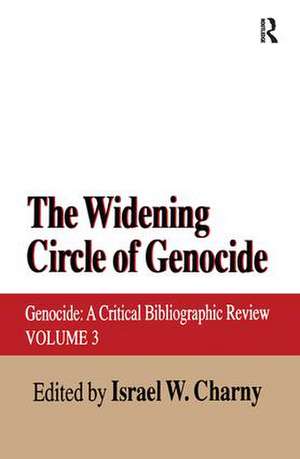The Widening Circle of Genocide: Genocide - A Critical Bibliographic Review: Genocide Studies
Autor Israel W. Charnyen Limba Engleză Paperback – 16 apr 2018
This volume presents scholarship on a variety of topics, including: Germany's records of the Armenian genocide; little-known cases of contemporary genocide in Afghanistan, East Timor, and of the Kurds; a provocative new interpretation of the psychic scarring of Holocaust survivors; and nongovernmental organizations that have undertaken the beginnings of scholarship on the worldwide problems of genocide. The Widening Circle of Genocide embodies reverence for human life; its goal is the search for new means to prevent genocide.
This work is distinguished by its excellence, originality, and depth of its scholarship. The first volume was selected by the American Library Association for its list of "Outstanding Academic Books of 1988-89." It is both compelling reading and an invaluable tool for scholars and students who wish to pursue specific fields of study of genocide. It will also be of interest to political scientists, historians, psychologists, and religion scholars.
| Toate formatele și edițiile | Preț | Express |
|---|---|---|
| Paperback (1) | 264.86 lei 6-8 săpt. | |
| Taylor & Francis – 16 apr 2018 | 264.86 lei 6-8 săpt. | |
| Hardback (1) | 679.76 lei 6-8 săpt. | |
| Taylor & Francis – 30 iun 1994 | 679.76 lei 6-8 săpt. |
Preț: 264.86 lei
Nou
Puncte Express: 397
Preț estimativ în valută:
50.68€ • 53.02$ • 42.10£
50.68€ • 53.02$ • 42.10£
Carte tipărită la comandă
Livrare economică 02-16 aprilie
Preluare comenzi: 021 569.72.76
Specificații
ISBN-13: 9781138517141
ISBN-10: 1138517143
Pagini: 404
Dimensiuni: 152 x 229 mm
Greutate: 0.45 kg
Ediția:1
Editura: Taylor & Francis
Colecția Routledge
Seria Genocide Studies
Locul publicării:Oxford, United Kingdom
ISBN-10: 1138517143
Pagini: 404
Dimensiuni: 152 x 229 mm
Greutate: 0.45 kg
Ediția:1
Editura: Taylor & Francis
Colecția Routledge
Seria Genocide Studies
Locul publicării:Oxford, United Kingdom
Cuprins
Introduction Part I: Democracy and the Prevention of Genocide 1 Democide in Totalitarian States: Mortacracies and Megamurderers Part II: Religion and Genocide 2 Religion and Genocide
Notă biografică
Israel W. Charny is Executive Director, Institute on the Holocaust and Genocide, Jerusalem; and Professor of Psychology & Family Therapy and Director, Program for Advanced Studies in Integrative Psychotherapy, Dept. of Psychology & Martin Buber Center, Hebrew University of Jerusalem
Descriere
This important study introduces the conceptual premise that families, like firms, analyze their circumstances, make decisions, and pursue courses of action on the basis of what they perceive to be the most efficient methods for producing and reproducing survival. Combining this premise with an extraordinary assemblage of facts gleaned over the period of a decade from the streets, markets and homes of Port-au-Prince, the author weaves a tapestry of despair and hope which only an unusual degree of intimacy with the details of everyday life in the city could provide. The result is a considerable deepening of understanding about the politics and economics by which family members earn their livelihoods, distribute resources within and between households, produce life and labor from food and water, provide shelter and schooling for themselves, and borrow money to finance these and other activities.These different dimensions of daily existence form a web of interdependency in which change in any one dimension causes change in all the others. As Professor Pass's work demonstrates, research and development assistance practices of public and private organizations, in such areas as employment, health, housing, education and credit are often irrelevant. This is because they are necessarily guided by prevailing concepts and theories with respect to the circumstances of the urban poor, which sometimes do the poor considerable disservice.With the additional insight provided by a decade of participation in the design of policies, programs and projects serving as a tempering influence, the author does not leap to easy criticism of prevailing views and practices. He notes that ideas and interventions change in response to new understanding, sometimes in ways that the producers of such understanding could never have imagined. The problem is that change is painfully slow, and in desperately poor countries like Haiti, waiting for change exacts an almost intolerable pric













